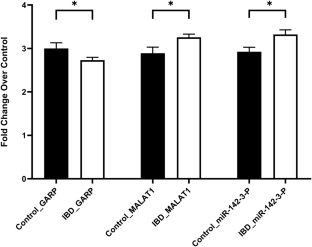Molecular Biology Reports ( IF 2.8 ) Pub Date : 2024-04-10 , DOI: 10.1007/s11033-024-09475-9 Mohammad Reza Lahimchi , Mousa Mohammadnia-Afrouzi , Rasoul Baharlou , Dariush Haghmorad , Seyed Hassan Abedi , Delaram Arjmandi , Masoomeh Hosseini , Bahman Yousefi

|
Background
Inflammatory bowel disease (IBD) is a chronic gastrointestinal (GI) condition comprising Crohn’s disease (CD) and ulcerative colitis (UC). The pathogenesis involves immune system dysregulation, with increased Th (T helper cell)17 cells and reduced regulatory T cell (Treg) differentiation. Transforming growth factor-β (TGF-β) secretion from Tregs helps control inflammation, and its production is regulated by glycoprotein-A repetition predominant (GARP) protein along with non-coding RNAs (ncRNAs) like microRNA(miR)-142-3p and metastasis associated lung adenocarcinoma transcript 1 (MALAT1) long non-coding RNAs (LncRNAs). This study analyzed their expression in IBD.
Methods
Blood samples were collected from 44 IBD patients, and 22 healthy controls (HC). RNA extraction and circular DNA (cDNA) synthesis were performed. Real-time polymerase chain reaction (RT-PCR) measured gene expression of GARP, MALAT1, and miR-142-3p. Correlations and group differences were statistically analyzed.
Results
Compared to controls, GARP was downregulated while MALAT1 and miR-142-3p were upregulated significantly in IBD group. GARP and MALAT1 expressions positively correlated in controls. MALAT1 and miR-142-3p expressions positively correlated in IBD group. MALAT1 was downregulated in aged HC but upregulated with smoking history across groups. No correlations occurred between gene expression and gender, diet, infections, or disease activity scores.
Conclusions
Dysregulation of GARP, MALAT1, and miR-142-3p likely contributes to inflammation in IBD by reducing TGF-β. MALAT1 is linked to smoking and age-related changes. These genes have potential as diagnostic markers or therapeutic targets for personalized IBD treatment.
中文翻译:

“解码炎症:糖蛋白 a 重复为主、microRNA-142-3-p 和转移相关肺腺癌转录物 1:作为炎症性肠病的新型炎症生物标志物”
背景
炎症性肠病(IBD)是一种慢性胃肠道(GI)疾病,包括克罗恩病(CD)和溃疡性结肠炎(UC)。发病机制涉及免疫系统失调,即 Th(辅助性 T 细胞)17 细胞增加和调节性 T 细胞 (Treg) 分化减少。 Tregs 分泌的转化生长因子-β (TGF-β) 有助于控制炎症,其产生受糖蛋白 A 重复优势 (GARP) 蛋白以及 microRNA(miR)-142-3p 等非编码 RNA (ncRNA) 的调节和转移相关肺腺癌转录物 1 (MALAT1) 长非编码 RNA (LncRNA)。本研究分析了它们在 IBD 中的表达。
方法
血液样本采集自 44 名 IBD 患者和 22 名健康对照 (HC)。进行RNA提取和环状DNA(cDNA)合成。实时聚合酶链反应 (RT-PCR) 测量 GARP、MALAT1 和 miR-142-3p 的基因表达。对相关性和组间差异进行统计分析。
结果
与对照组相比,IBD 组 GARP 显着下调,而 MALAT1 和 miR-142-3p 显着上调。 GARP 和 MALAT1 表达在对照组中呈正相关。 IBD组中MALAT1和miR-142-3p的表达呈正相关。 MALAT1 在老年 HC 中表达下调,但随着各组吸烟史的增加表达上调。基因表达与性别、饮食、感染或疾病活动评分之间没有相关性。
结论
GARP、MALAT1 和 miR-142-3p 的失调可能通过减少 TGF-β 导致 IBD 炎症。 MALAT1 与吸烟和年龄相关的变化有关。这些基因有潜力作为个性化 IBD 治疗的诊断标记或治疗靶点。



























 京公网安备 11010802027423号
京公网安备 11010802027423号